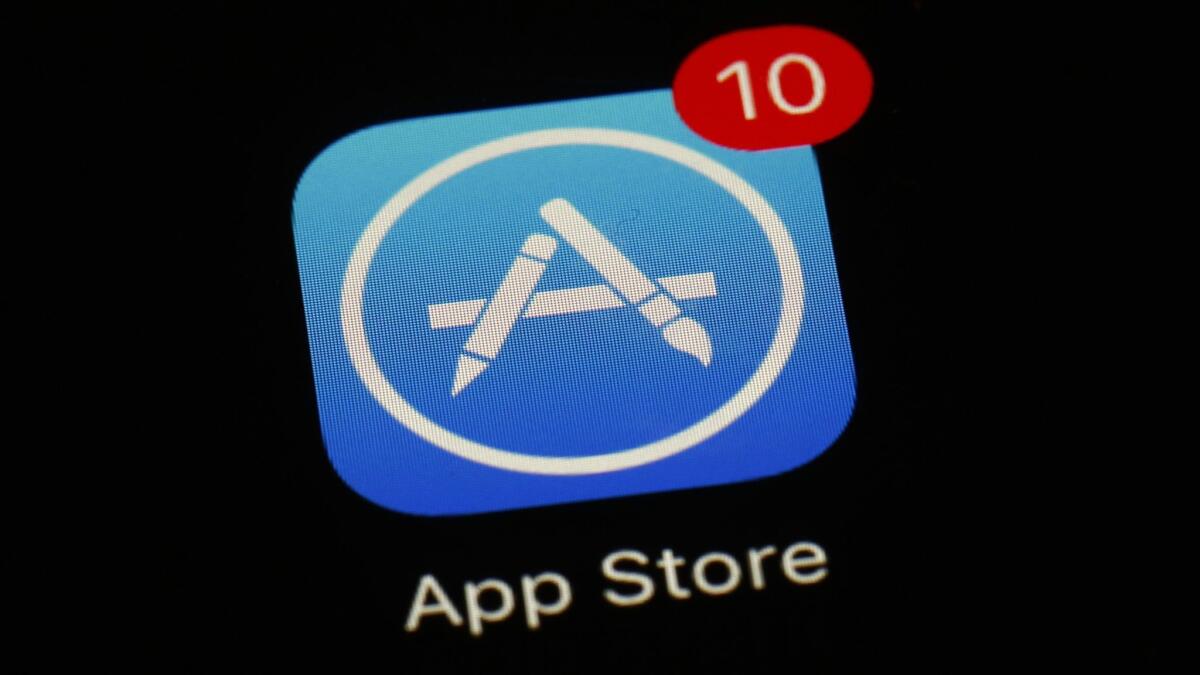Editorial: Who’s paying too much at the Apple App Store?

- Share via
The U.S. Supreme Court took up a case Monday that millions of Americans have a stake in: a potential class-action lawsuit accusing Apple of gouging people who buy apps for their iPhones. But though Apple exerts an unwelcome amount of control over the apps market, the risk for consumers and businesses alike is that the court will muddy the liability waters in a way that deters innovation online.
The case against Apple was brought by a man named Robert Pepper and three other iPhone owners, who want to represent all consumers who bought iPhone apps through Apple’s App Store. That’s just about anyone who’s purchased an iPhone app, given that the iPhone’s software works only with apps from the App Store, all of which Apple has to approve before they can be sold.
Pepper alleges that the company inflated app prices by requiring developers to pay Apple a 30% “commission” on all their app sales. The result, Pepper contends, is that Apple has used its monopoly over the App Store to make apps more expensive than they would be in a competitive market.
There needs to be a clear way to enforce antitrust law that neither dampens the creative energy that the internet unleashes nor encourages monopolistic abuses.
That has all the hallmarks of a big company using its dominance to wring more cash out of consumers. And the U.S. 9th Circuit Court of Appeals agreed, allowing Pepper’s lawsuit to move forward to trial. But the situation isn’t as simple as it looks, which is one reason the Supreme Court agreed to hear Apple’s appeal.
Apple argues that even though it runs the App Store and collects payments from consumers, it isn’t a conventional retailer — the store is merely a platform it created for the convenience of developers, who set their own prices. Nor is it using its position to drive up prices improperly, Apple says. As the company notes, some developers may choose not to pass along the cost of the commission to their customers, depending on the demand and the competition they face. Beyond that, consumers who don’t like the prices at the App Store can always switch to a non-Apple phone, of which there are many.
A key argument in Apple’s defense is a 1977 Supreme Court ruling (in Illinois Brick vs. Illinois) that allowed only a “direct” purchaser of an item to sue on antitrust grounds. The rule was imposed to make sure that only the actual victim of a monopoly’s price gouging could collect the triple damages the law provides. Here, Apple says, the 30% commission is paid by app developers, who have not sued. Consumers who buy apps are affected only indirectly by the commission, Apple argues, because it’s up to the developer to decide how much, if any, of the cost to include in its price.
The problem with the 1977 model is that it’s not a good fit for the current era of dominant online middlemen operating platforms that bring buyers and sellers together for a fee. These platforms are ripe for abuse by their operators, given that it’s hard (or in Apple’s case, impossible) for anyone else to offer an alternative marketplace. That’s because the more widely used the platforms are, the more attractive they become to both consumers and developers. You wouldn’t want to swap your iPhone or Android smartphone for a phone that had few apps available for it, and developers wouldn’t want to write software for a phone with few users.
Enter the Fray: First takes on the news of the minute from L.A. Times Opinion »
At the same time, one of the great things about platforms such as the App Store is that they have encouraged bountiful innovation by giving developers around the world an easy path to a huge number of consumers, to the benefit of both. There needs to be a clear way to enforce antitrust law that neither dampens the creative energy that the internet unleashes nor encourages monopolistic abuses.
The Supreme Court actually went the other direction earlier this year, issuing a new rule (in Ohio vs. American Express) for judging “transaction” platforms that left internet companies guessing whether it would apply to them. The App Store appears to be an online version of a “transaction” platform — do the rules the court applied to Amex also apply to Apple, and to other, similar setups on the internet? The justices should use Pepper’s lawsuit to clear up that mystery, giving online companies and antitrust enforcers alike a better idea where the lines are drawn.
Follow the Opinion section on Twitter @latimesopinion and Facebook
More to Read
A cure for the common opinion
Get thought-provoking perspectives with our weekly newsletter.
You may occasionally receive promotional content from the Los Angeles Times.









